VTD/8 Tori
Remaining faithful to its reputation for excellence and based on its invaluable experience in this field, Micro-Matic Research has taken advantage of the current power of PC and Server technology and of the performance of MS Windows protocols to design and develop a new generation of its famous VTD/8 communication server. VTD/8 Tori is the migration of the software running on the VTD/8 hardware gateways to a full software implementation running on platforms operating in a Windows 32-bit environment.
The user interface and the core software have been fully separated. The gateway core software runs as a Windows Service and handles file transfer and printing by itself without requiring the user interface to be running. Core software and user interface can run on separate systems using Windows networking for remote access to the Registry and the Service Manager, and a TCP connection for communication between the user interface and the core software. Of course, this new VTD/8 communication server inherits all the features and benefits you expect from Micro-Matic Research.
Simplicity, flexibility, real-time, fast interventions are keywords in the short list of requirements of today's Network Management. The VTD/8 Tori Network Management allows network configuration changes to be done on-line without interrupting the GCOS communication and thus without disconnecting its user group.
VTD/8 Tori Network Management also includes Printer Management supporting the following printer destinations : to files or directories, to Windows printer queues, to LPD queues, to LPT ports and to local printers.
VTD/8 Tori Cluster offers integrated back-up. Up to four VTD/8 Tori instances can be installed with a maximum of 4000 simultaneous sessions. The Cluster principle is based on MMR's VIRGA Link technology for load leveling and automatic back-up. The major advantage of VTD/8 Tori Cluster is the fact that the session license is now handled on cluster level instead of on server level.
As the focus on network security grows, more and more companies move to encrypted LAN traffic. VTD/8 Tori supports Secure Sockets Layer to protect all communication between server and clients against possible eavesdropping or message forgery over the LAN. The availability of SSL on both VTD/8 Tori Server and VTD/Amaril client protects your PC-to-Host communication to a maximum level. SSL encryption can be used for all protocols based on TCP/IP : Telnet, TNVIP and VGP.
VTD/8 Tori offers you ...
- new streamlined platform ready for future evolutions
- flexible and cost effective network management
- high-availability concept
- secure communication through full end-to-end SSL
- easy migration from existing VTD/8 communication servers
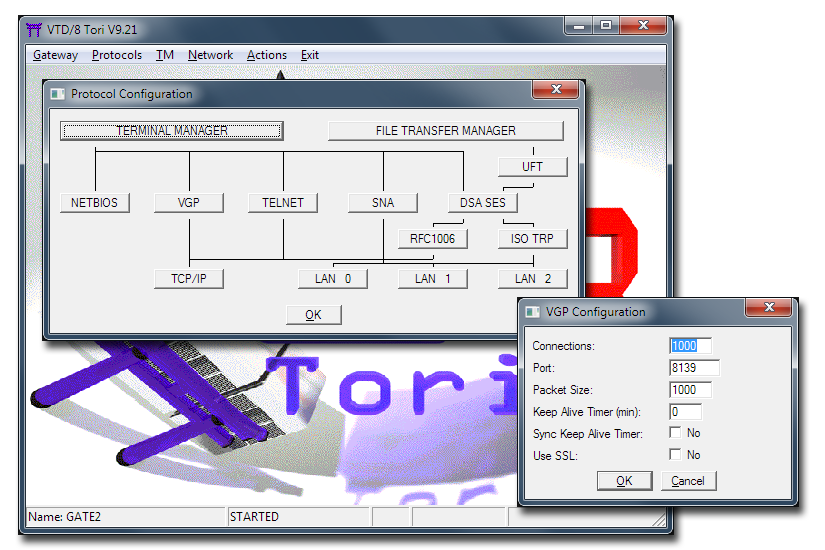
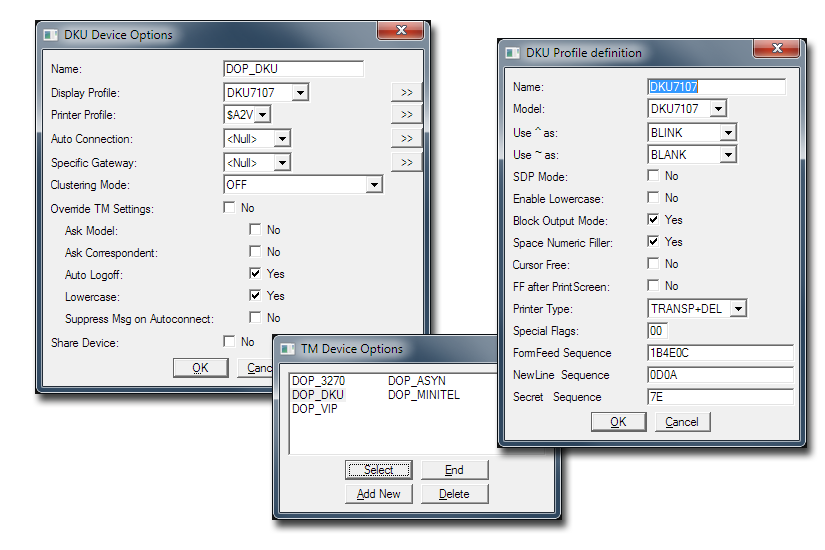
Technical specifications :
- The VTD/8 Tori software runs on recent Windows platforms as well as virtual platforms like VMWare.
- Capacity : 1000 simultaneous sessions, dedicated or shared in a pool, each with screen and printer session, at 950 transactions per second.
- Host Connectivity : RFC1006, Telnet.
- Terminal Connectivity : VGP, TNVIP, TN3270, Telnet, Windows Netbios.
- File Transfer Manager functions : UFT, Microfit.
VTD/Amaril
The 32-bit VTD/Amaril emulator software was introduced in 1998, and was a great success already from the first day. It replaced the 16-bit VTD/Win emulator which has a proven worldwide history starting in the mid 90's.
Amaril's aesthetics and ergonomic implementation have been designed with particular care. In addition, an object-oriented, interactive and dynamic script language (SBL), with the most advanced setup utilities, provides a level of personalization which few Windows products are able to achieve. Any modifications made by the various Amaril configuration utilities are dynamic and therefore immediately visualized, which makes the user interface particularly attractive.
All menu titles, questions, dialog windows and error messages in the program are by default available in four different languages: English, Dutch, French and German. The modular use of the Amaril objects allows you to even add your own language to the software !
Your network administrator can centrally create and distribute the Amaril configuration for every user in the company. Automatic detection and installation of updates is possible without additional user intervention.
VTD/Amaril supports Secure Sockets Layer to secure communications through encryption. SSL encryption can be used for all protocols based on TCP/IP : VGP over Winsock, Telnet, TNVIP and SID/RFC1006. If your host system doesn't support SSL, you can use an intermediate software called a 'tunnel'. VTD/Amaril connects securely to one side of this tunnel. Free implementations for several operating systems of a software tunnel supporting SSL are available on the internet.
Furthermore, the VTD/Amaril emulator software supports the ISO/DSA protocol over RFC1006. This allows a direct primary connection to a GCOS system without using a gateway or TNVIP server, as required with secondary connections. It contains a class 0 ISO transport layer, a DSA session layer and a simple, 'dialogless' terminal manager. By using TCP/IP all the way from the Amaril workstation to the GCOS mainframe, no translation into ISO/DSA has to be done. This makes connecting to the legacy application and transfering files even faster than before !
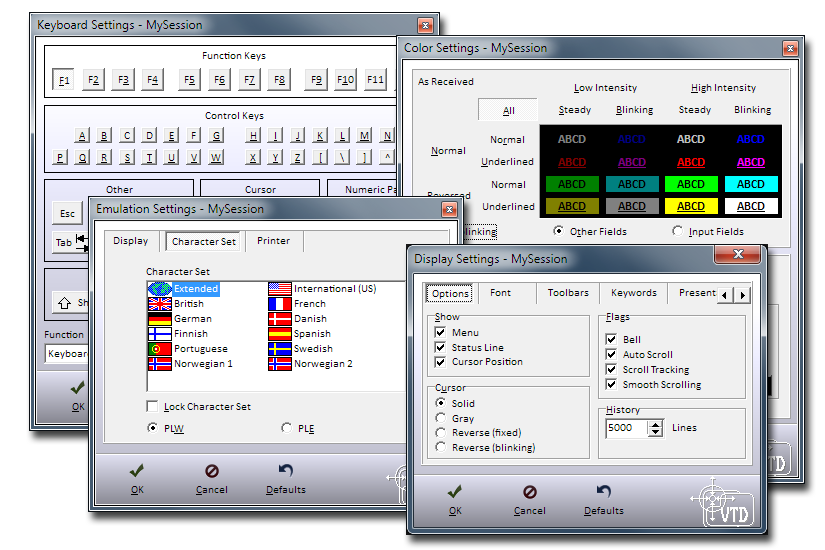
Object Technology
The use of objects has led to the creation of a product which is characterized by a high level of modularity. Modeling, in the form of objects, of different entities manipulated by Amaril (file transfers, automatic connections, interface components such as colors, menus, toolbar, etc.) makes administration much easier.
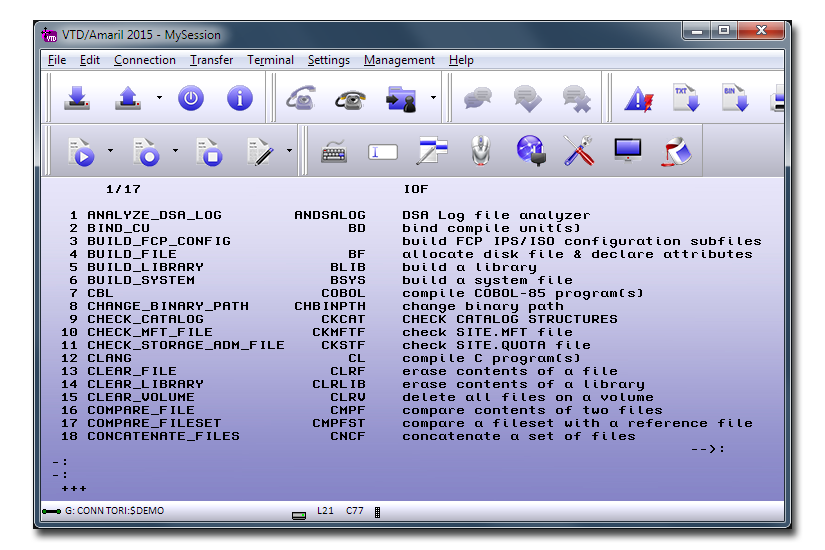
Platform independent
The VTD/Amaril version 2015 software runs smoothly on any Windows 7 and Windows 8 (32 and 64 bit), Windows XP, Windows Server 2008 and Windows Server 2013 platforms.
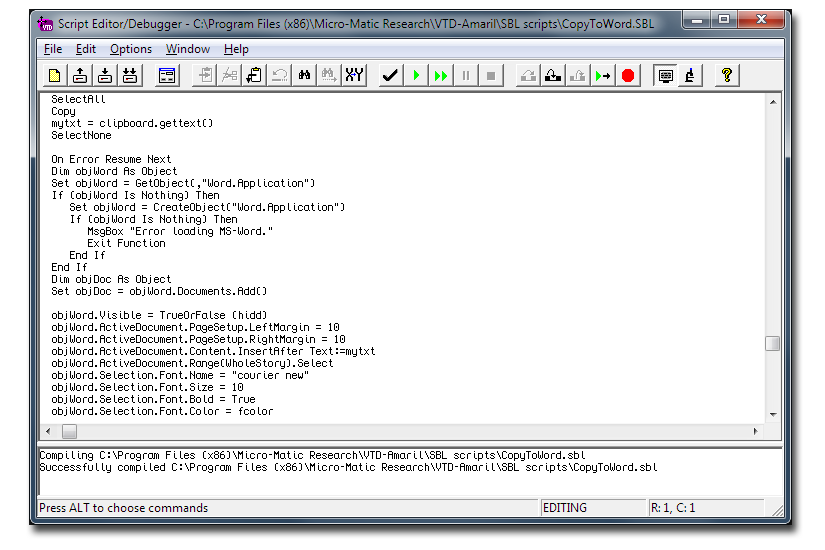
The power of scripts
Amaril has an environment which is entirely dedicated to producing scripts, making it extremely easy to automate functions such as automatic connections, file transfers, printing, data entry sequences and many more, using the 'Script Editor / Recorder / Debugger / Dialog Editor'.
Protocols and Emulations :
Bull :
- DKU7007, DKU7107, DKU7211, VIP7700, VIP7804 and VIP7814 synchronous emulations
- VIP7801 asynchronous emulation
- TTU and PRU printer emulations
- SDP mode support
- UVTI implementation
- MicroFit and XFT file transfers
- access types supported : RFC1006, Telnet, TNVIP and VGP
Dec/Unix VT :
- VT100, VT220, VT320 and VT420 synchronous emulations
- 80 and 132 column modes
- access types supported : Telnet, Serial Port and VGP
